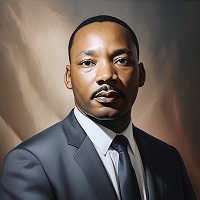

Quotes By Martin Luther King Jr.

Leader
Martin Luther King Jr.
Jan 15, 1929 - Apr 04, 1968
Let us consider, first, the need for a tough mind, characterized by incisive thinking, realistic appraisal, and decisive judgment. The tough mind is sharp and penetrating, breaking through the crust of legends and myths and sifting the true from the false.
The average Negro is born into want and deprivation. His struggle to escape his circumstances is hindered by color discrimination. He is deprived of normal education and normal social and economic opportunities.
God cannot at the same time impose his will upon his children and also maintain his purpose for man.
I saw further that the underlying purpose of segregation was to oppress and exploit the segregated, not simply to keep them apart. Even when we asked for justice within the segregation laws, the "powers that be" were not willing to grant it.
The pen of the Great Emancipator had moved the Negro into the sunlight of physical freedom, but actual conditions had left him behind in the shadow of political, psychological, social, economic and intellectual bondage. In the South, discrimination faced the Negro in its obvious and glaring forms. In the North, it confronted him in hidden and subtle disguise.
A society that has done something special against the Negro for hundreds of years must now do something special for him, in order to equip him to compete on a just and equal basis.
To this day the white poor also suffer deprivation and the humiliation of poverty if not of color. They are chained by the weight of discrimination, though its badge of degradation does not mark them. It corrupts their lives, frustrates their opportunities and withers their education. In one sense it is more evil for them, because it has confused so many by prejudice that they have supported their own oppressors.
Most whites in America in 1967, including many persons of goodwill, proceed from a premise that equality is a loose expression for improvement. White America is not even psychologically organized to close the gap-essentially it seeks only to make it less painful and less obvious but in most respects to retain it.
Nonviolent direct action seeks to create such a crisis and establish such creative tension that a community that has consistently refused to negotiate is forced to confront the issue. It seeks so to dramatize the issue that it can no longer be ignored.
It is disappointment with the Christian church that appears to be more white than Christian, and with many white clergymen who prefer to remain silent behind the security of stained-glass windows.
One aspect of the civil-rights struggle that receives little attention is the contribution it makes to the whole society. The Negro in winning rights for himself produces substantial benefits for the nation.
Arnold Toynbee has said that some twenty-six civilizations have risen upon the face of the earth. Almost all of them have descended into the junk heaps of destruction. The decline and fall of these civilizations, according to Toynbee, was not caused by external invasions but by internal decay. They failed to respond creatively to the challenges impinging upon them.
Why is equality so assiduously avoided? Why does white America delude itself, and how does it rationalize the evil it retains?
The majority of white Americans consider themselves sincerely committed to justice for the Negro. They believe that American society is essentially hospitable to fair play and to steady growth toward a middle-class Utopia embodying racial harmony. But unfortunately this is a fantasy of self-deception and comfortable vanity.
This limited degree of concern is a reflection of an inner conflict which measures cautiously the impact of any change on the status quo. As the nation passes from opposing extremist behavior to the deeper and more pervasive elements of equality, white America reaffirms its bonds to the status quo. It had contemplated comfortably hugging the shoreline but now fears that the winds of change are blowing it out to sea.
The history of the movement reveals that Negro-white alliances have played a powerfully constructive role, especially in recent years. While Negro initiative, courage and imagination precipitated the Birmingham and Selma confrontations and revealed the harrowing injustice of segregated life, the organized strength of Negroes alone would have been insufficient to move Congress and the administration without the weight of the aroused conscience of white America.
Just as a doctor will occasionally reopen a wound, because a dangerous infection hovers beneath the half-healed surface, the revolution for human rights is opening up unhealthy areas in American life and permitting a new and wholesome healing to take place.
America is still struggling with irresolution and contradictions. It has been sincere and even ardent in welcoming some change. But too quickly apathy and disinterest rise to the surface when the next logical steps are to be taken. Laws are passed in a crisis mood after a Birmingham or a Selma, but no substantial fervor survives the formal signing of legislation. The recording of the law in itself is treated as the reality of the reform.
Whenever the church, consciously or unconsciously, caters to one class it loses the spiritual force of the "whoso-ever will, let him come" doctrine, and is in danger of becoming little more than a social club with a thin veneer of religiosity.
The Negro had been deeply disappointed over the slow pace of school desegregation. He knew that in 1954 the highest court in the land had handed down a decree calling for desegregation of schools "with all deliberate speed."
Popular Authors









